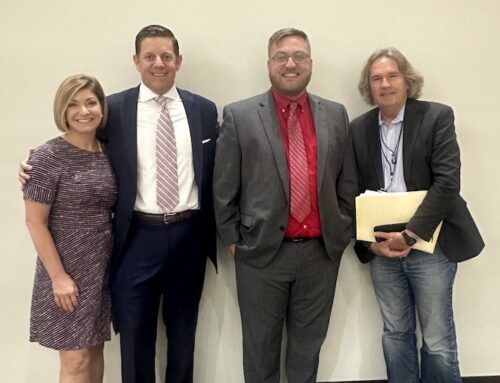Sociology professor studying immigration files public records suit against Knox County sheriff
A sociology professor who researches immigration enforcement has filed a public records lawsuit against the Knox County Sheriff, claiming the office has repeatedly violated the law in denying and delaying access to public records.
Meghan Conley has made a series of requests over the past 19 months for records related to the sheriff’s office’s 287(g) program that started almost two years ago.

Under the 287(g) program, the Knox County Sheriff’s Office is authorized by U.S. Immigration and Customs Enforcement to identify and detain immigrants suspected of being in the country without authorization.
Conley requested correspondence with ICE, records related to training and implementation, agreements related to detention and transportation, and arrest records of those held under ICE-issued immigration holds.
“KCSO has repeatedly violated Professor Conley’s PRA rights by (1) failing to make timely response to requests…(2) ignoring requests…(3) denying requests on frivolous legal grounds, such as lack of specificity or requiring compilation…(4) denying inspection requests with no justification…(5) and denying requests for demonstrably false factual reasons…” the lawsuit alleges.
Sheriff denies access to arrest records
For example, the lawsuit says that when Conley requested to inspect arrest reports of inmates held pursuant to ICE-issue immigration holds, the sheriff’s office attorney Mike Ruble said that there was no public access point for inspections — that the system is for law enforcement use only — and that she could only obtain arrest records by making daily requests for a limited number of arrest record copies.
“Prohibiting all inspection requests plainly violates the PRA’s inspection requirements,” the lawsuit says. Conley argues that if the database holding the arrest records is not accessible to the public, the sheriff’s office is required to retrieve the arrest reports requested from the database to fulfill the request.
“As a matter of policy, KCSO also limits citizens to requesting only a few arrest reports every day. This is impermissible under the PRA and, given its policy barring record inspection, effectively denies researcher access to any meaningful quantity of arrest reports,” the suit says.
The sheriff’s office also denied some of Conley’s requests, saying that they were too unspecific to fulfill and required compiling information. For example, in response to one request regarding correspondence and memorandums, Ruble replied that requests that ask “for ‘any and all’ records both request the compilation of records prohibited by the (public records) statute, and fail the statutory requirement of specificity.”
Suit: Sheriff misuses “specificity” requirement to deny requests
Conley asserts in her lawsuit, however that the words “any and all” are permitted in records requests and cited Tennessee Supreme Court and Court of Appeals cases that upheld access to records in which the request included the words “any” or “all”, including instances where the requests were much more expansive and covered several years worth of documents, as opposed to the weeks or months of records she requested.
“The PRA only requires that ‘(a)ny request for inspection or copying of a public record shall be sufficiently detailed to enable the governmental entity to identify the specific records for inspection.’ Tenn. Code Ann. § 10-7-503(a)(4). While asking for a known document by name is undoubtable more specific than a categorical request, requiring requests to identify by name the records sought defeats the PRA’s animating principle of granting ‘the fullest possible public access to public records,’ Tenn. Code. Ann. § 10–7–505(d), by effectively limiting requests to those records whose names are already known,” the petition says.
“That a request identifies ‘exactly what you’re asking for so that we don’t have to sort through files’ destroys any possibility of uncovering potentially critical documents with unknown titles by limiting a requestor to the narrow range of records whose names are already known.”
Conley also argues in the lawsuit that her requests do not require the sheriff’s office to compile information and that the sheriff’s office has “willfully misinterpreted the established definition of compile.”
Professor says arrest records for immigrants can be readily produced
The public records law states that a government entity does not have to “sort through files to compile information,” but Conley argues that a 1998 Tennessee Supreme Court case, Tennessean v. Electric Power Board, established that once information is entered into a computer database, the government entity has the responsibility to extract the requested information.
“The Court reasoned that it would ‘frustrate the purpose of the Public Records Act at nearly every turn’ to permit government officials to ‘design [computer] systems with access in mind, only to claim later that information is unavailable because ‘our computers can’t do that.’ ”
“KCSO is now doing exactly what the Tennessean court feared: denying PRA requests of available digital information by claiming impossibility. There is no doubt that KCSO possesses Professor Conley’s requested information. And, unlike in Tennessean, the requested records here are readily accessible through KCSO’s pre-existing system without the need for additional software.”
Conley is represented by attorney Andrew Fels. In addition to being a sociology professor at University of Tennessee, Conley is co-director of Allies of Knoxville’s Immigrant Neighbors, a group that advocates for immigrant rights and has organized protests against renewing the two-year 287(g) agreement at the end of June.
Conley is in the process of writing a book about immigration enforcement, and included a book chapter with the filing. She notes that she has authored or co-authored more than 20 academic works, peer-reviewed journal articles and book chapters, and has given more than 50 academic or community presentations on immigration enforcement.




